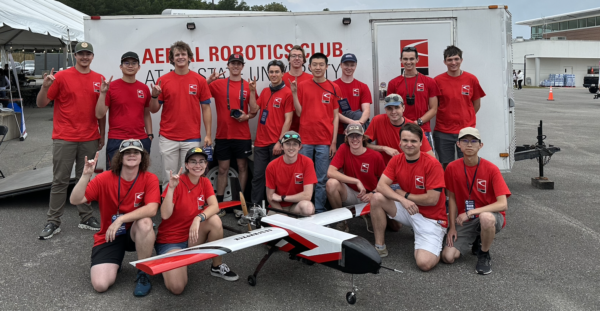The Aerial Robotics Club (ARC) at NC State University competed late last month in the 2023 Student Unmanned Aerial Systems (SUAS) Competition in St. Mary’s Regional Airport in Maryland.
72 total teams were registered to compete, but only 31 were actually able to fly. Over 20 teams are international universities or military academies. ARC placed 29 in their presentation score, 2nd place in mission demonstration and 29th overall.
According to Former ARC President Blake Monkus, the team encountered some issues during the mission demonstration.
“Unfortunately, our aircraft went outside the flight boundary after 8 minutes of flying which terminated our flight before our payload delivery element for mission demonstration,” Monkus said.
But they were not alone in obstacles like this one, a myriad of which inhibited many other teams at the competition during demonstration, causing a 30 way tie for 2nd place.
Despite unexpected challenges leading to a deduction in points, Monkus says the team’s work went above and beyond this year and they performed even better than they did at last year’s competition.
“It may not seem like it, but our performance was much better this year than last year,” Monkus said. “We received a lot of complements from judges and other teams about our plane’s design, our payload delivery method, and in general how cool the plane looked and sounded in the air.”
The team also had a record number of members attend the competition, filling all 16 available slots.
According to Monkus, this year’s competition and the time leading up to it held a considerable number of hurdles to overcome, and he is impressed with the team’s resilience under pressure, and ability to adapt to the changing circumstances and still employ excellent professionalism with the judges and other teams.
“Overall I am pleased with the progress made over the year by ARC. We persevered through some hard times and were able to get a lot of valuable flight testing done. Because of some severe weather anticipated we weren’t even sure we would be allowed to fly, so I am grateful we had the opportunity to attend, compete, and actually fly,” Monkus said. “We received a lot of compliments from judges, competition organizers, and teams about Akela (our aircraft) as well as our team’s professionalism.
Monkus graduated this past spring and he said that’s while it’s hard to leave the club behind, it gave him his best college memories and he knows it will continue to thrive under the leadership of incoming ARC president James Sorber.
“The ARC community and mentorship is unmatched to any other club,” Monkus said. “It is essential for students to practice the theory they learn in classes in a diversified team like ARC. ARC teaches manufacturing, aircraft design, payload design, autonomous electronics, imaging, networking, flight testing, team work, and professional development with our sponsors and alumni. I have confidence that there will always be an amazing community in ARC and that they will continue to do really cool research in Unmanned Aerial Systems.”
To learn more about the ARC aircraft, Akela, or to learn more about the team’s work during this year’s competition, check out their 2023 presentation video.

